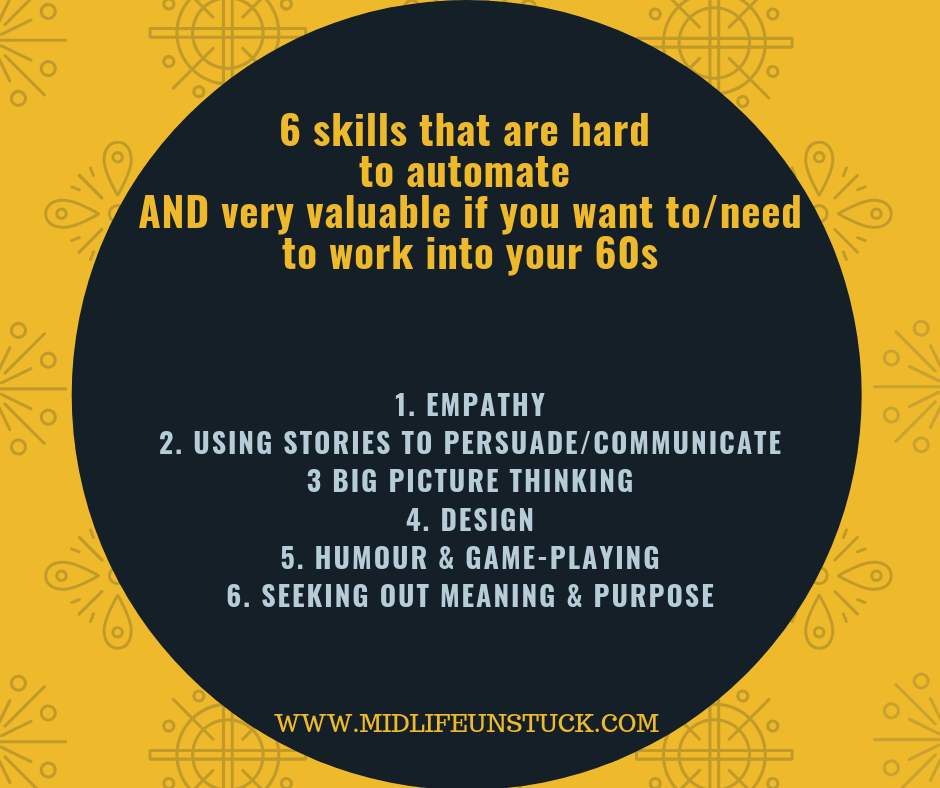6 skills to help future-proof your career (and earn a good living into your 50s and 60s)
In this article, you’ll learn what aptitudes you need to either learn or hone in order to increase your potential to earn a very good living over the next few decades.
By 2030 (I'll be 58yrs old then!) 800 million jobs are expected to be lost due to automation and the robotic workforce, according to a study on the future of work by the Mckinsey Global Institute. The research was performed across 46 countries and 800 occupations.
So what?
We’ve all seen this happen over our working lives in low-wage occupations (annoying automated call centres, smart cleaning systems, advanced analytical tools, humanless order-taking etc) but what about our high-wage occupations?
To future-proof our careers, we need to specialise in the very special, high-value human talents that are very difficult to automate or replicate by technology.
Can CEOs/MDs roles be automated?
Mckinsey Global Institute specifically estimate that 20% of most CEO’s workload could be automated today by adapting current technology and that percentage is only going to increase each year. But, the line in their report that got my brain fizzing was “Capabilities such as creativity and sensing emotions are core to the human experience and are also difficult to automate.”
So, I picked up Dan Pink’s “A Whole New Mind” again, in which he predicts that career success in the future will rely on our right-brain skills (see below) rather than our logical left-brained skills which got us to where we are today.
Why?
Because right-brain aptitudes are very hard to automate, so these will be the aptitudes that will offer us high-value work in our late stage careers.
The left-brained activities will be automated.
According to Pink, the Top 6 right-brain aptitudes that hold the power to future-proof our careers are:
Empathy
Using stories to persuade and communicate
Big picture thinking
Design
Humour, laughter, game playing
Seeking out and connecting purpose and meaning?
How many of your daily activities utilise these aptitudes?
If the answer less than four or five, I’d urge you to work out ways to learn these skills, practise them until they become natural enough to build into your daily work. This new learning, combined with all of your experience to date, has the power to future-proof your earnings for the next couple of decades.
If you’re already using many of them, keep honing them until they become some of your Superpowered offering that lets you stand out from the competitive marketplace, now and in 20 years time.
Quick and dirty analysis - my former career v my new career
In my 19 year corporate career, I used only two of these aptitudes daily (EMPATHY and SEEKING OUT PURPOSE & MEANING) so the writing was on the wall.
I’ve analysed that I'm now using five out of these six right-brain aptitudes in my daily work.
That said, many of them are newer skills that I’m constantly learning more about by reading books, watching Youtube, consuming Ted Talks and generally experimenting with them in my daily work and life.
Today, (oddly perhaps?) the PLAY element of work is the trickiest one for me to build into my work. Thankfully, my two daughters are helping me out with that one! I’m also in the process of learning more about DESIGN which interests me but I feel way behind the curve having had very little exposure in my life so far.
Should you worry?
There is no need to be in any way worried about the next decades of your career - if the work that you love AND your Superpowers include skills that computers find hard to perform. But even if they don’t, there’s time to learn them and layer them into your future work.
Impacts of right-brained aptitudes in interviews for left-brained roles
In my old world of head-hunting, my specialism could have been described as seeking out the perfect left-brained Finance Director to help companies grow financially.
I saw the left-brained activity forming the basics of a role profile.
But, I found those who were able to display high-performance in right-brained aptitudes in interviews were much more successful.
Success came more often to:
Those who could empathise with the specific people problems within the business;
Those who could convince the CEO/MD/HRD of their personal fit by telling impactful head and heart stories in a way that fit with the company culture;
Those who demonstrated their bigger picture vision of finance and connected it to the design of their roles (and their teams’ roles) to import greater meaning into the purpose of their finance team.
Those who appeared to be more fun to work with!
Past, present and future for executive roles
In the past, left-brained skills were base level requirements for many senior roles. Right-brained aptitudes were a differentiator.
Currently, value is placed on the combination of left-brained and right-brained aptitudes.
In the future, right-brained aptitudes will be base level requirements.
To earn a good living well into our 50s and 60s, we need to have all six of these skills in our experience tool-kit and have honed them into our Superpowers.
I bet my entire career on it!
Want to deliberately design your next decade of work to be more enjoyable than your last?
Check out The Fierce Emporium career make-over programme.
Book in here to discuss if it’s right for you.




